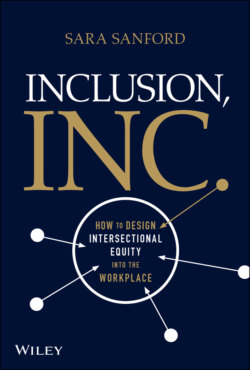Читать книгу Inclusion, Inc. - Sara Sanford - Страница 28
Attending Trainings While Underestimated
ОглавлениеThe Journal of Experimental Social Psychology described white men's reactions to pro-diversity trainings and messaging as follows: “We found evidence that it not only makes white men believe that women and minorities are being treated fairly—whether that's true or not—it also makes them more likely to believe that they themselves are being treated unfairly.”17
If white men saw that diversity messaging was present before applying for or interviewing for a job, “[these] messages signaled to these white men that they might be undervalued and discriminated against. These concerns interfered with their interview performance and caused their bodies to respond as if they were under threat. Importantly, diversity messages led to these effects regardless of these men's political ideology, attitudes toward minority groups, beliefs about the prevalence of discrimination against whites, or beliefs about the fairness of the world. This suggests just how widespread negative responses to diversity may be among white men: the responses exist even among those who endorse the tenets of diversity and inclusion.”18
Underestimated employees aren't unaware of the reactions that their peers can have to diversity trainings and programming. They witness their co-workers becoming defensive or angry and worry that this friction will turn into retaliation.
Because trainers are aware of the defensiveness that white employees may feel, they often try to “tone down” the training content to avoid conflict. For many employees of color, this means having to sit through hearing their experiences being minimized or trivialized. The discrimination they've experienced becomes euphemized as “differences in perspectives,” or they are encouraged to “find common ground” with those who have excluded them. Consequently, underestimated groups can leave trainings feeling even more discouraged and undervalued than before.
Finally, in reviewing responses that employees have provided to GEN's national workplace experience survey, we noted repeated versions of this experience: “Any time we have a training or company meeting about diversity, I am the only Black person in the room. Even if I don't raise my hand, at some point, someone will turn to me and ask me for my opinion—as a Black person—about diversity in our office. What am I supposed to say? I don't speak for all Black people. And I'm not gonna say what I really think.”
The status of being “the only” suddenly becomes synonymous with being “the expert” or “the representative” in conversations about diversity. As this respondent stated, “I don't speak for all Black people.” No race or gender is a monolith. The experiences of one underestimated individual do not necessarily reflect those of other underestimated individuals, and asking one to speak on behalf of a group is an unfair burden. Not only do individuals not want to misrepresent their peers, they do not want to put themselves at risk. Should the one Black person in the room be honest and risk making their white peers defensive and angry? Or, should they perform the emotional labor of comforting their peers with a watered-down version of their experiences as The Black Person in the Workplace?
Trainings create impossible choices for anyone who is “the only” in the room.
